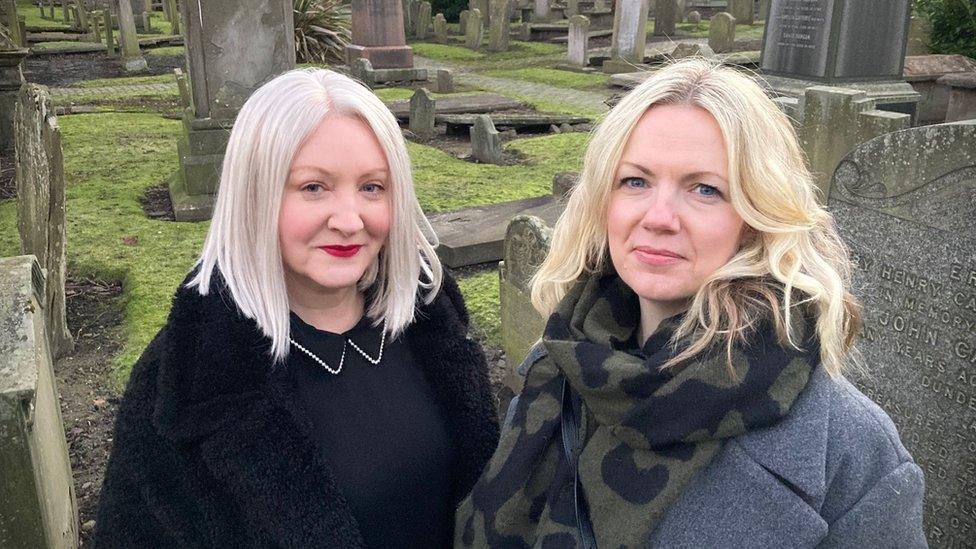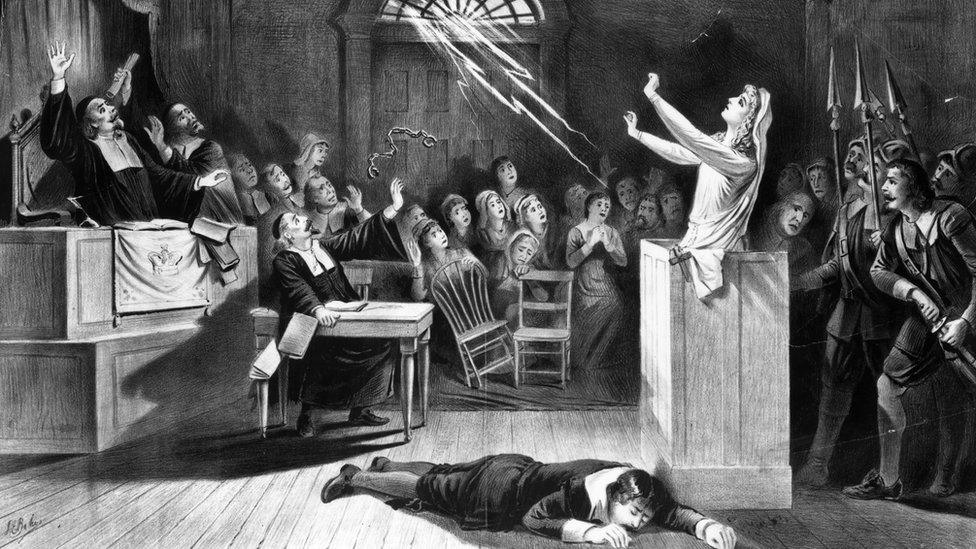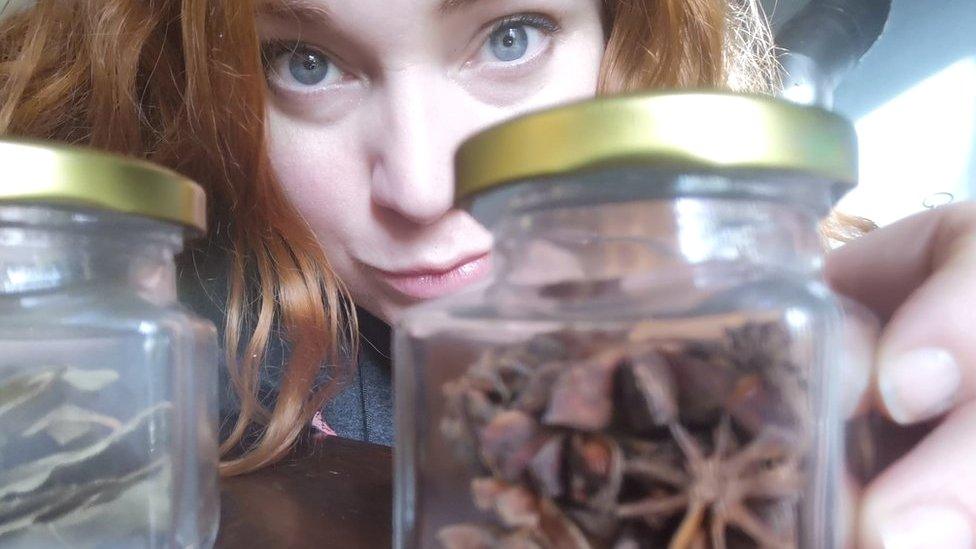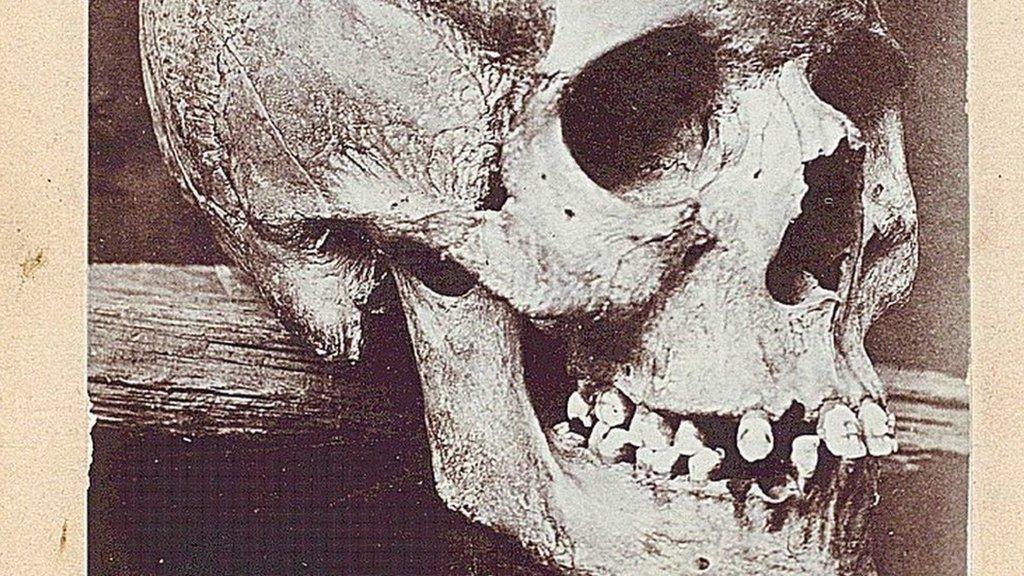Witch apology would 'send powerful signal'
- Published

Claire Mitchell QC and Zoe Venditozzi of the Witches of Scotland campaign, in Dundee's Howff burial ground
A public apology to those accused of witchcraft between the 16th and 18th Centuries would send a powerful symbolic signal, campaigners have said.
They said a statement from the Scottish government would help to right a terrible wrong from Scotland's past.
It would also send an important message to countries where witch hunts still take place today.
The Witches of Scotland campaign, external wants Nicola Sturgeon to make a statement on International Women's Day on 8 March.
The campaign, which was launched two years ago, is trying to secure a legal pardon for the estimated 2,500 people, mainly women, who were convicted and executed under Scotland's Witchcraft Act.
It is thought that 4,000 Scots were accused of breaking the law, which was in force from 1563 until 1736. About 85% were women.
National memorial
Witch hunts took place in many countries during that period, but academics say Scotland's execution rate was five times the European average.
Confessions were secured under torture. The condemned person was strangled and their body burnt.
Claire Mitchell QC, co-founder of Witches of Scotland, said a public apology would be an important first step towards making amends.
She said: "We're seeking a pardon for all of those convicted of witchcraft, an apology for all of those accused and a national memorial so we can remember what happened in the past.
"We're going to ask the Scottish government on this International Women's Day to make it clear that they accept that what happened to these people was a terrible miscarriage of justice and to apologise on behalf of the people of Scotland."
Ms Mitchell said witchcraft trials were still happening around the world and they were becoming more frequent because of the pandemic.
"We think it would be important if Scotland stands up and says, 'we accept what happened was wrong'.
"That would send out a powerful signal and hopefully help others."

Thousands of women were accused of witchcraft
That's backed by Nigerian human rights activist Leo Igwe, who campaigns against modern day witch hunts in Africa.
"What happened in Scotland hundreds of years ago, is happening now in many parts of Africa," he said.
"People are accused of witchcraft when there are misfortunes in their families - sudden deaths, accidents, and other tragic, unfortunate experiences such as loss of a child, divorce and marital difficulties.
"People accuse most often vulnerable members of their family, mainly women, sometimes children and people with disabilities. They say they caused these misfortunes through magical means."
Mr Igwe said the accusations came with serious consequences including lynching, mob attack and beheading.
He said the campaign in Scotland would send a message to the people who were doing that right now as well as giving hope to the accused.
"It will send a message to our politicians who are enabling the persecution of witches through their action or inaction," he said.
Legal precedent
SNP MSP Natalie Don is planning to put forward a private members' bill in the Scottish Parliament to win a pardon for people convicted under the Witchcraft Act.
She said she had the support of her SNP colleagues, meaning the bill would only require the votes of a small number of opposition MSPs to become law.
"It's essentially admitting that this wasn't a criminal act and that these people shouldn't go down in history as criminals," she said. "They should be given a posthumous pardon.
"The really positive messages I've had, shows that this is important to a lot of people. It's symbolic and it could be really important going forward at home and internationally."
The historian and author Prof Sir Tom Devine supports a pardon but questions the relevance of an apology.
He said: "I am not convinced of the merits of an apology for the obvious reason that what happened to those poor folk was not in any way the responsibility of Scottish people living in 2022.
"Pardoning has more attractions but also with some difficulties.
"What convinces me, however, is that most of those found guilty in Scotland gave 'confessions' delivered under torture.
"There is also legal precedent for a pardon. Those executed after the infamous Salem witch trials in the USA were declared innocent under Massachusetts state law in 2001."
A spokesman for the Scottish government said it acknowledged that those accused and convicted of the offence of witchcraft, the majority of whom were women, faced discrimination and had very little protection in law.
He said: "We will carefully consider any proposal for a Members' Bill in this area."
Related topics
- Published30 October 2021

- Published28 October 2014
